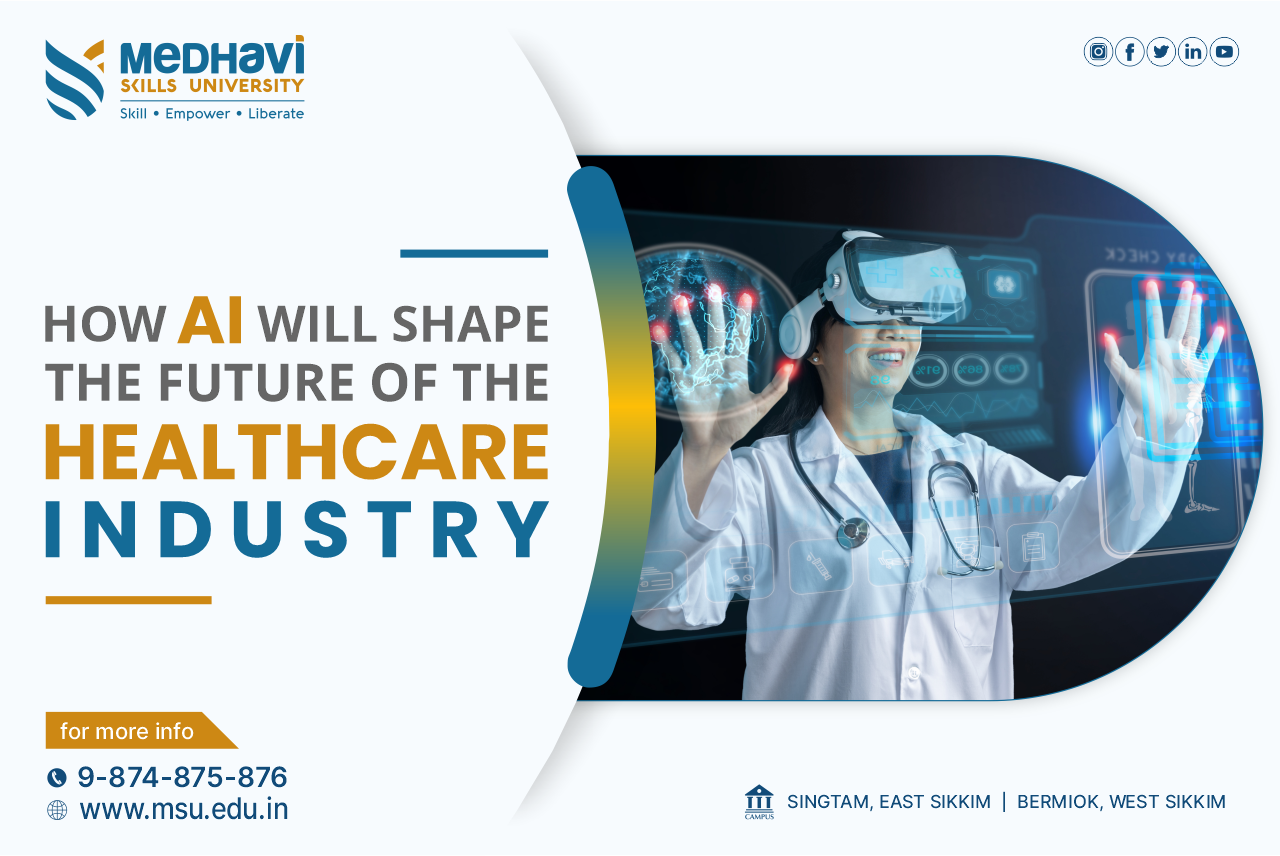How AI Will Shape the Future of the Healthcare Industry.
Artificial Intelligence (AI) is poised to revolutionize the healthcare industry, transforming the way medical professionals diagnose diseases, treat patients, and manage healthcare systems. With its ability to analyze vast amounts of data, identify patterns, and make intelligent predictions, AI has the potential to enhance patient care, improve efficiency, and drive medical innovations. In this article, we will explore how AI will change the future of the healthcare industry and its implications for patients, healthcare providers, and society as a whole.

Enhanced Diagnostic Capabilities
AI can significantly improve diagnostic capabilities by analyzing patient data, medical images, and genetic information. Machine learning algorithms can quickly and accurately detect patterns and anomalies in medical scans, aiding in the early detection of diseases such as cancer, cardiovascular conditions, and neurological disorders. AI-powered diagnostic tools have the potential to reduce diagnostic errors, improve accuracy, and provide timely interventions for better patient outcomes.
Personalized Treatment Plans
AI can enable personalized treatment plans based on individual patient characteristics, medical history, and genetic information. By analyzing vast datasets and comparing patient profiles with similar cases, AI algorithms can suggest the most effective treatment options and predict patient responses to specific therapies. Personalized treatment plans can improve treatment efficacy, reduce adverse effects, and optimize patient outcomes.
Precision Medicine and Drug Discovery
AI has the potential to accelerate the development of precision medicine and the discovery of new drugs. By analyzing genetic information, medical records, and clinical trial data, AI algorithms can identify patterns and correlations that can lead to the development of targeted therapies. AI-powered drug discovery platforms can significantly reduce the time and cost involved in identifying potential drug candidates, bringing innovative treatments to patients more quickly.
Streamlined Healthcare Operations
AI can streamline healthcare operations by automating administrative tasks, optimizing resource allocation, and improving workflow efficiency. AI-powered systems can assist in patient scheduling, electronic health record management, and billing processes, reducing administrative burdens on healthcare professionals. AI algorithms can also help optimize hospital bed management, staff scheduling, and inventory management, ensuring efficient utilization of resources and improving patient flow.
Remote Patient Monitoring and Telemedicine
AI-enabled remote patient monitoring systems and telemedicine platforms can revolutionize healthcare delivery, particularly in remote areas and underserved communities. AI algorithms can analyze real-time patient data collected through wearable devices, providing insights on vital signs, medication adherence, and disease progression. Telemedicine platforms powered by AI can enable virtual consultations, remote diagnosis, and follow-up care, expanding access to healthcare and improving patient convenience.
AI-Assisted Surgery and Robotics
AI can assist surgeons in performing complex procedures with increased precision and safety. Surgical robots powered by AI algorithms can augment surgical capabilities, allowing for minimally invasive procedures, reduced post-operative complications, and faster recovery times. AI can also analyze preoperative data to assist in surgical planning and optimize surgical outcomes.
Healthcare Data Analytics and Insights
AI can revolutionize healthcare data analytics, enabling researchers and healthcare providers to gain valuable insights from large datasets. AI algorithms can analyze electronic health records, medical imaging data, and clinical trial results, identifying patterns, predicting outcomes, and improving population health management. Data-driven insights can guide public health strategies, disease surveillance, and resource allocation.
Ethical Considerations and Data Privacy
As AI becomes more integrated into healthcare, ethical considerations and data privacy become paramount. Safeguarding patient data, ensuring transparency in AI algorithms, and addressing biases are crucial. Establishing regulatory frameworks and ethical guidelines for AI use in healthcare is necessary to maintain trust, protect patient privacy, and ensure equitable access to AI-driven healthcare solutions.
FAQs
Will AI replace healthcare professionals?
No, AI will not replace healthcare professionals. AI technologies are designed to augment and assist healthcare professionals in their decision-making processes and provide valuable insights. Human expertise, empathy, and the ability to interpret complex medical situations are irreplaceable.
How can AI improve patient outcomes?
AI can improve patient outcomes by enhancing diagnostic accuracy, enabling personalized treatment plans, and facilitating early disease detection. AI algorithms can identify risks, predict patient responses, and optimize treatment strategies, leading to better patient care and improved health outcomes.
What are the challenges of implementing AI in healthcare?
Challenges of implementing AI in healthcare include data privacy concerns, interoperability issues, the need for regulatory frameworks, and addressing ethical considerations. It’s essential to ensure patient data protection, promote data sharing and collaboration, and establish guidelines for responsible and ethical AI use in healthcare.
How can AI contribute to population health management?
AI can contribute to population health management by analyzing large datasets to identify health trends, predict disease outbreaks, and guide public health interventions. AI algorithms can assist in identifying high-risk populations, optimizing preventive measures, and improving healthcare resource allocation.
Will AI make healthcare more affordable?
AI has the potential to make healthcare more affordable in the long run by improving efficiency, reducing diagnostic errors, and enabling preventive interventions. However, initial implementation costs and the need for infrastructure upgrades may pose short-term challenges.
Conclusion
AI is set to revolutionize the future of the healthcare industry, empowering healthcare professionals with advanced tools and insights to improve patient care, optimize treatment strategies, and drive medical innovations. By harnessing the power of AI responsibly, addressing ethical considerations, and ensuring patient privacy, we can create a healthcare system that is more efficient, personalized, and accessible to all, ultimately leading to better health outcomes for individuals and communities.


